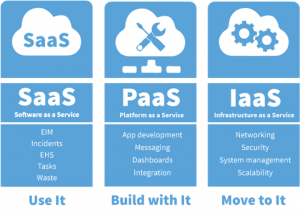What was once considered a competitive advantage has now become a necessity.
The amount of data churned out in every aspect of business has gone beyond the capacities of physical self-maintained servers; organizations do not want to handle the workload of maintaining, scaling, and monitoring the servers.
Instead, all you have to do is outsource your infrastructure needs be it hardware or software, and all you have to do is just manage the applications and train your workforce to operate that application.
There are three major cloud platform services: IaaS, PaaS & SaaS.

When you are removed from the hassles of maintaining the backend infrastructure or hardware, you just have to manage software layers along with building applications, it is called Infrastructure as a Service (IaaS)
When you outsource both hardware and software infrastructure to third party services, allowing you just to create applications of your own, it is called Platform as a Service (PaaS)
When you purchase out-of-the-box cloud-based services or applications for use without even going through the pain of creating the applications, it is called Software as a Service (SaaS).
Each and every aspect of an organization can be moved to the cloud.
You can store all the information related to an organization’s activities centrally on the cloud, store your customer information in an application like Salesforce, manage the enterprise through an enterprise software like SAP, and even manage your documents digitally in a document management system from the cloud.
In the age of the internet, digital transformation, and the need to put your customers first and provide them with a seamless user experience, organizations have no other choice but to move most of their processes to a cloud computing environment.
What are the advantages of moving to the cloud?
- You can pay as you go for the services you want
- The data is centrally located
- You are free from maintaining the infrastructure
- Secure environment
- Scale-up and down the servers based on incoming traffic
- You can opt for a public or private cloud
For KCL Cloud, a database management company moving to the cloud has been the most rewarding experience, here’s why
- All the documents are centrally located.
- Every user access and file activity is logged in
- Searching a document is faster
- You can access documents from anywhere
- Employees can collaborate efficiently irrespective of their location
- A lot of work processes can be automated
- It saves time, effort, and money
- Security and accountability at every step
- Faster audits
Along with the above benefits, you can also easily integrate our database management system with other enterprise cloud software and applications just with a few clicks, allowing KCL e-cloud to capture data easily from everywhere and convert it into a digital document.
Cloud computing is here to stay, and what was once considered a competitive advantage has now become a necessity.
This was evident more than ever during the global pandemic, which compelled businesses to labor around the clock to transform their organizations at an unprecedented pace and scale digitally.
Cloud computing services from Microsoft Azure, Amazon Web Services, and many other public and private cloud computing platforms have enabled this rapid shift.
Moving to the cloud helps connect the hundreds – sometimes thousands – of different software solutions, technologies, and platforms that companies rely on to quickly deliver their products and services to customers.
Move your business to the cloud to gain a loyal customer base and skyrocket your profits!






0 Comments